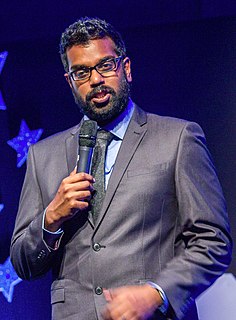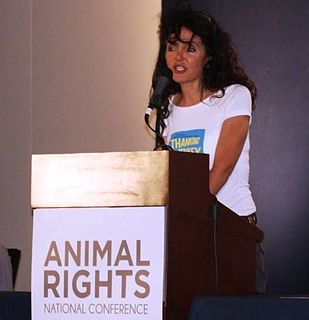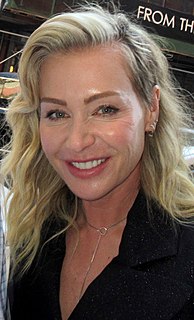A Quote by Sara Pascoe
I wrote on my website that veganism isn't right for everyone and the first thing you have to consider is nutrition. I was saying that some use veganism as a form of eating disorder and that careful vegans replace what they cut out of their diet.
Related Quotes
I find it very annoying that so many animal advocates talk about the difficulty of being vegan. Many animal advocates are inclined to make the issue their suffering and not the animals' suffering, and I suppose that accounts for part of the reason that veganism is portrayed as such a "sacrifice." And many animal advocates are not vegans, or are "flexible vegans," which means that they do not observe veganism at all or not consistently, and emphasizing the supposed difficulty of veganism is part of justifying their own behavior.
The most important form of incremental change is the decision by the individual to become vegan. Veganism, or the eschewing of all animal products, is more than a matter of diet or lifestyle; it is a political and moral statement in which the individual accepts the principle of abolition in her own life. Veganism is the one truly abolitionist goal that we can all achieve - and we can achieve it immediately, starting with our next meal.
Some people feel that humans have a right to eat other animals but not to trash the earth. They may choose veganism because a vegan's ecological footprint is light, but once they are not invested in eating animals, they are more likely to be willing to learn the details of what happens to them. That learning will encourage compassionate people to stick with a plant-based diet.
Eating meat and dairy products is the SAD (Standard American Diet) diet. The SAD diet can only make you sad. It causes heart disease, cancer, diabetes and makes you fat. Raising animals for food destroys the environment... And those animals are not happy. They are enslaved and live humiliating, fearful lives of abuse and tremendous suffering. Veganism turns sadness into joy.
Ethical veganism results in a profound revolution within the individual; a complete rejection of the paradigm of oppression and violence that she has been taught from childhood to accept as the natural order. It changes her life and the lives of those with whom she shares this vision of nonviolence. Ethical veganism is anything but passive; on the contrary, it is the active refusal to cooperate with injustice
I finally understood that by being on a perpetual diet, I had practiced a "disordered" form of eating my whole life. I restricted when I was hungry and in need of nutrition and binged when I was so grotesquely full I couldn't be comfortable in any position by lying down. Diets that tell people what to eat or when to eat are the practices inbetween. And dieting, I discovered, was another form of disordered eating, just as anorexia and bulimia similarly disrupt the natural order of eating.
Many people will first be attracted to veganism for their health but find themselves far more open to learning about the animal issues when they don't have to block them out three times a day in order to enjoy eating. Then once people learn, it is hard to forget and go back. Come for the body, stay for the soul.
I know of nothing else in medicine that can come close to what a plant-based diet can do. In theory, if everyone were to adopt this, I really believe we can cut health care costs by seventy to eighty percent. That's amazing. And it all comes from understanding nutrition, applying nutrition, and just watching the results.





























